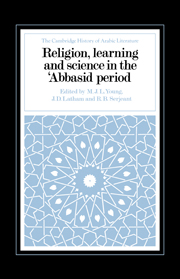Book contents
- Frontmatter
- Epigraph
- Contents
- List of plates
- Editorial preface
- List of abbreviations
- Map Literary, political and religious centres in the ʿAbbasid period
- 1 Sunnī theology
- 2 Shīʿī theological literature
- 3 Ibāḍī theological literature
- 4 Quranic exegesis
- 5 The prose literature of Ṣufism
- 6 Philosophical literature
- 7 Arabic lexicography
- 8 Arabic grammar
- 9 Islamic legal literature
- 10 Administrative literature
- 11 Arabic biographical writing
- 12 History and historians
- 13 Faṭimid history and historians
- 14 Mathematics and applied science
- 15 Astronomy
- 16 Astrology
- 17 Geographical and navigational literature
- 18 The literature of Arabic alchemy
- 19 Arabic medical literature
- 20 Al-Kindī
- 21 Al-Rāzī
- 22 Al-Fārābī
- 23 Ibn Sīnā
- 24 Al-Bīrūnī and the sciences of his time
- 25 Al-Ghazālī
- 26 Christian Arabic literature in the ʿAbbasid period
- 27 Judaeo-Arabic literature
- 28 The translation of Greek materials into Arabic
- 29 Didactic verse
- Glossary
- Bibliography
- Index
6 - Philosophical literature
Published online by Cambridge University Press: 05 July 2014
- Frontmatter
- Epigraph
- Contents
- List of plates
- Editorial preface
- List of abbreviations
- Map Literary, political and religious centres in the ʿAbbasid period
- 1 Sunnī theology
- 2 Shīʿī theological literature
- 3 Ibāḍī theological literature
- 4 Quranic exegesis
- 5 The prose literature of Ṣufism
- 6 Philosophical literature
- 7 Arabic lexicography
- 8 Arabic grammar
- 9 Islamic legal literature
- 10 Administrative literature
- 11 Arabic biographical writing
- 12 History and historians
- 13 Faṭimid history and historians
- 14 Mathematics and applied science
- 15 Astronomy
- 16 Astrology
- 17 Geographical and navigational literature
- 18 The literature of Arabic alchemy
- 19 Arabic medical literature
- 20 Al-Kindī
- 21 Al-Rāzī
- 22 Al-Fārābī
- 23 Ibn Sīnā
- 24 Al-Bīrūnī and the sciences of his time
- 25 Al-Ghazālī
- 26 Christian Arabic literature in the ʿAbbasid period
- 27 Judaeo-Arabic literature
- 28 The translation of Greek materials into Arabic
- 29 Didactic verse
- Glossary
- Bibliography
- Index
Summary
Arabic philosophic writing is a form of Arabic literature. Like Arabic poetry and artful prose it employs generally accepted opinions, rhetorical reasoning and devices, and imaginative projections to persuade and move an audience with particular linguistic and cultural habits, traditions and inclinations, and it responds to particular questions and deals with particular problems, which in turn shape its style and manner of exposition. Unlike most other forms of Arabic literature, however, Arabic philosophic writing tends to respond to questions and deal with problems that have to do with the audience's beliefs and opinions about matters theoretical and practical, human and divine, which the philosopher and his audience take to be of paramount importance both for the conduct of everyday life and ultimate salvation. Thus it tends to be serious but not humourless, rational but not inattentive to the role of emotions, rigorous but not unplayful, harsh but not misanthropic. Its scope is universal, dealing with all branches of knowledge; and in this respect philosophy is often compared to dialectic, rhetoric and poetry. In fact Arabic philosophic writing uses most of the rules of dialectic, rhetoric and poetry to examine and clarify generally accepted opinions, and to persuade and arouse the audience to embrace and endorse certain views and courses of action or to reject and abhor others.
- Type
- Chapter
- Information
- Religion, Learning and Science in the 'Abbasid Period , pp. 76 - 105Publisher: Cambridge University PressPrint publication year: 1990
- 2
- Cited by



